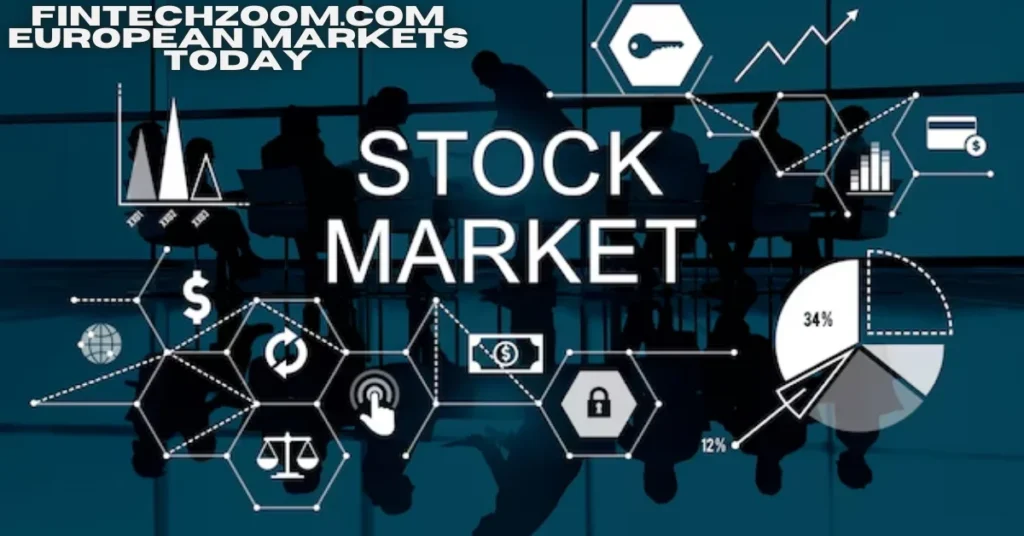Introduction
In the fast-paced world of finance, keeping an eye on market indexes is crucial for investors, traders, and financial enthusiasts. Today, we’re diving into Fintechzoom.com, a leading platform for tracking real-time financial data. Specifically, we’ll explore the significance of fintechzoom.com european markets today indexes, how they function, and how you can leverage fintechzoom.com european markets today to stay updated.
European market indexes hold immense importance, reflecting the performance of some of the biggest and most influential companies in Europe. Whether you’re following the FTSE 100 or the DAX, understanding these indexes can give you insight into broader market trends. Let’s take a closer look at how they work.
What is Fintechzoom.com?
Fintechzoom.com is a comprehensive financial platform providing users with real-time data on stock markets, forex, cryptocurrencies, and more. It offers expert analysis, up-to-date financial news, and easy-to-use tracking tools, making it a go-to for both novice and seasoned investors.
Launched with the goal of democratizing financial information, Fintechzoom.com aims to bridge the gap between complex market data and the average investor. Whether you’re looking for stock prices or in-depth economic analysis, Fintechzoom.com has you covered.
Understanding Market Indexes
A market index is a statistical measure that tracks the performance of a group of stocks, typically representing a particular sector or the economy of a region. They provide a snapshot of market health and can help investors gauge overall market performance.
Why do market indexes matter? They allow investors to track the performance of the stock market over time, helping them make informed decisions about where to invest their money.
The Role of European Market Indexes
European market indexes play a pivotal role in global finance. With some of the world’s most established economies, European indexes provide insights into the economic health of the continent and beyond. They’re often seen as a barometer for global economic stability.
But what sets European indexes apart from global ones? European indexes tend to be more diversified across sectors such as industrials, healthcare, and finance, compared to the tech-heavy indexes of the U.S. This means they provide a broader view of economic performance across various industries.
Overview of the Top European Market Indexes
FTSE 100
The FTSE 100 represents the 100 largest companies listed on the London Stock Exchange by market capitalization. Established in 1984, it’s one of the most followed indexes globally, often used as a benchmark for international investors. Key companies in the FTSE 100 include BP, HSBC, and AstraZeneca.
DAX (Germany)
Germany’s DAX index includes 40 of the largest companies listed on the Frankfurt Stock Exchange. The DAX is a key indicator of German economic health, home to multinational giants like Volkswagen, Siemens, and Bayer. It’s seen as a proxy for the strength of the broader European economy.
CAC 40 (France)
The CAC 40 tracks 40 of the largest companies on the Euronext Paris. As France’s primary stock market index, it reflects the performance of companies in diverse sectors like luxury goods, pharmaceuticals, and telecommunications. Notable companies include LVMH and TotalEnergies.
Euro Stoxx 50
This index tracks the 50 largest companies across multiple European countries. It’s considered one of the best barometers of Europe’s economic landscape. Major players include companies from Germany, France, Spain, and the Netherlands, giving it a pan-European perspective.
How European Market Indexes Are Calculated
Price-Weighted vs. Capitalization-Weighted Indexes
Market indexes can be price-weighted or capitalization-weighted. In a price-weighted index, the stock price determines its influence on the index. A capitalization-weighted index, however, gives more weight to larger companies based on their total market value.
Free Float Adjustments
Free float refers to the portion of shares available to the public for trading. When calculating market indexes, adjustments are made to account for this, ensuring the index reflects only the tradable shares.
Factors Influencing European Market Indexes
Political Climate
Political stability and regulatory changes in the European Union significantly impact market performance. Events like Brexit and EU policy changes can either boost or disrupt the market.
Economic Reports
Key economic indicators, such as GDP, inflation rates, and unemployment figures, provide valuable insights into market trends. A strong economy often leads to higher stock prices, while economic downturns can trigger sell-offs.
Global Market Influence
Europe’s economy doesn’t exist in a vacuum. Global markets, especially in the U.S. and Asia, can have a ripple effect on European indexes. If the U.S. stock market crashes, European markets often follow suit.
Recent Trends in European Market Indexes
Post-COVID Recovery
The European market has seen a gradual recovery post-pandemic. Stimulus packages and a renewed focus on rebuilding economies have helped many sectors bounce back, although the pace varies across countries.
Technology and Renewable Energy Companies
The rise of tech and renewable energy sectors is reshaping European market indexes. Companies involved in green energy and digital innovation are becoming more prominent in the index compositions, signaling a shift toward sustainability and tech-driven growth.
How to Track European Market Indexes on Fintechzoom.com
Fintechzoom.com offers a suite of tools to track European market indexes in real-time. Users can access charts, set alerts for specific stocks, and view detailed market summaries. Its user-friendly interface makes it easy for investors to stay informed.
Why Fintechzoom.com Is a Go-To for Market Insights
Real-Time Data
One of Fintechzoom’s key features is its provision of real-time data, ensuring that users are always up-to-date with the latest market movements.
In-Depth Analysis
Beyond just numbers, Fintechzoom offers expert analysis that helps users understand the broader market context, making it easier to interpret trends and forecasts.
User-Friendly Interface
The platform is designed to be intuitive, allowing users to navigate easily and customize their dashboard for a personalized experience.
Conclusion
European market indexes offer a window into the economic performance of some of the world’s most influential countries. By staying informed about these indexes, you can make smarter investment decisions. And with platforms like Fintechzoom.com, you have access to real-time data and expert analysis, all in one place.
FAQs
What is “Fintechzoom.com European markets today”?
Fintechzoom.com European markets today is a financial platform providing real-time data, insights, and analysis on European market indexes, helping investors track performance and trends.
How do European market indexes function?
European market indexes track the performance of major companies, offering a snapshot of market health and helping investors make informed decisions based on economic trends.
Why are European market indexes important for investors?
They reflect the economic performance of influential companies, serving as indicators for broader market stability and guiding investment strategies.
What tools does Fintechzoom.com offer for tracking these indexes?
Fintechzoom.com provides real-time charts, alerts for specific stocks, and detailed market summaries, making it easy for users to stay informed.
What are some key European market indexes featured on Fintechzoom.com?
Key indexes include the FTSE 100, DAX, CAC 40, and Euro Stoxx 50, each representing major companies across Europe and offering diverse insights into market trends.







